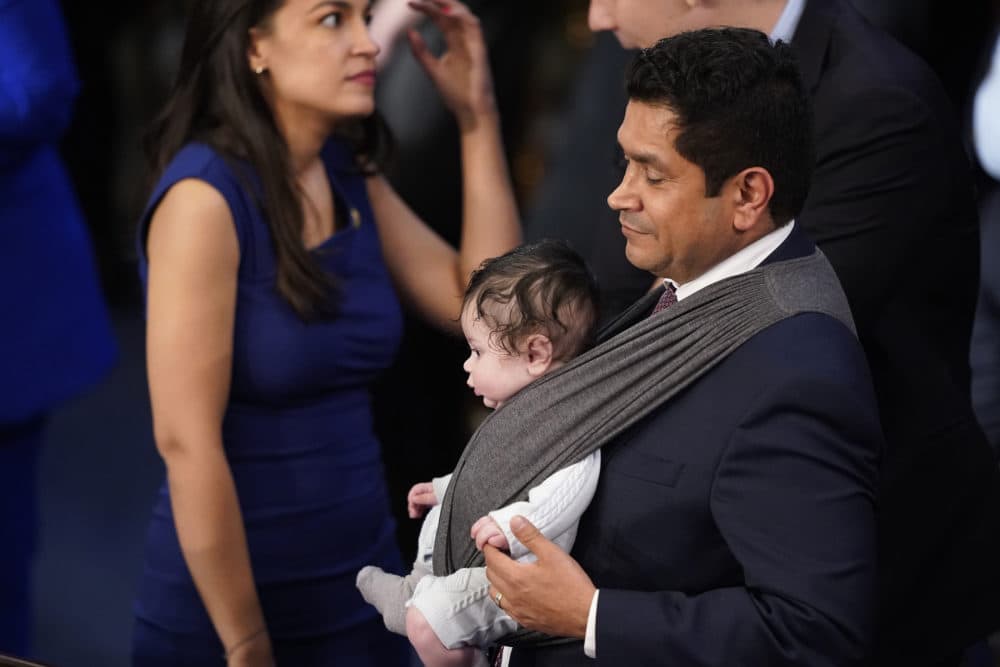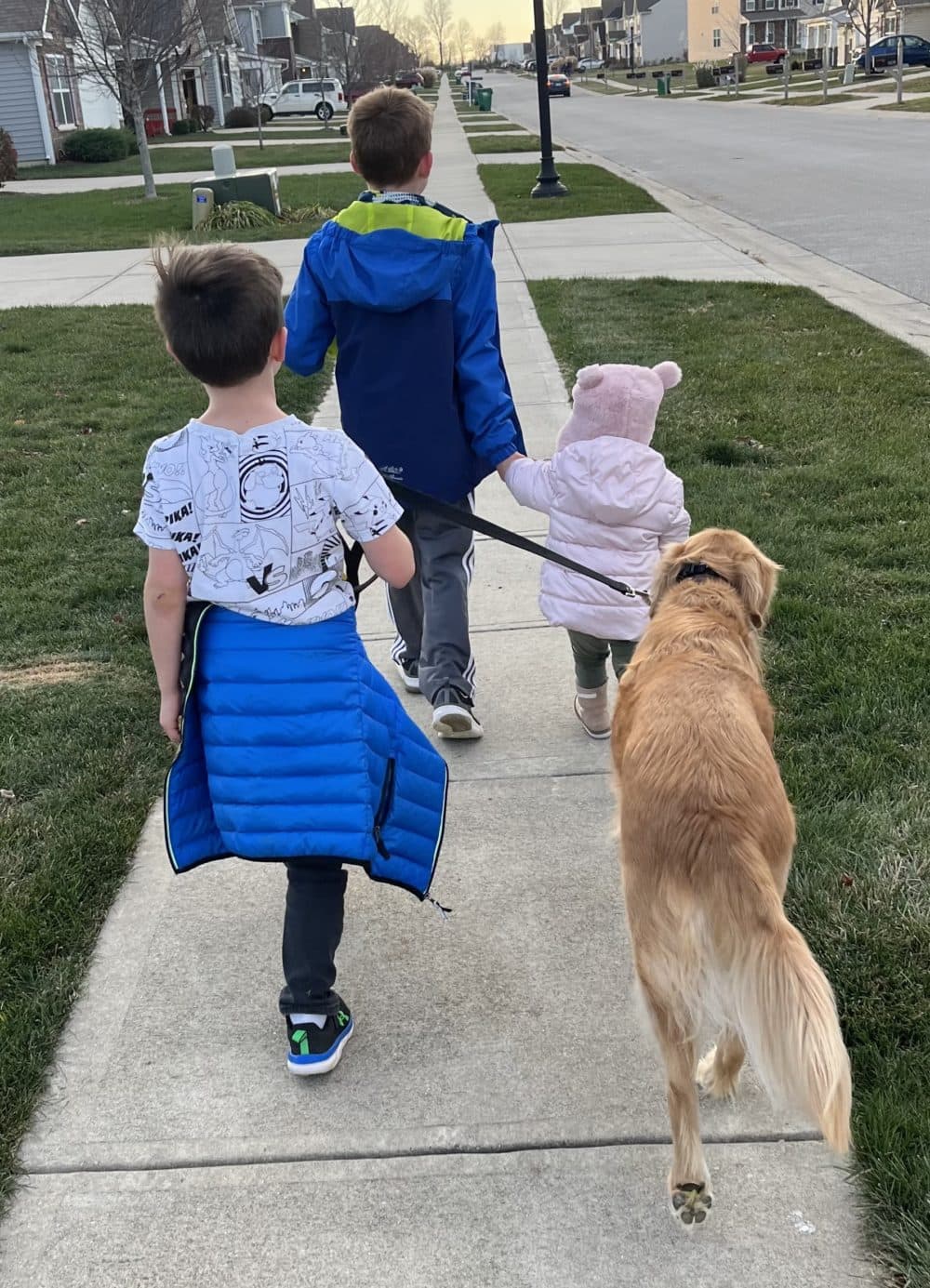Advertisement
Congressman – and first time dad – says men need to step up on child care solutions
Resume
California Democratic Rep. Jimmy Gomez knows the parenting double-standard is real.
He admits he got "outsized" attention when he wore his baby son, Hodge, in a carrier on the House floor last month during the speaker election of Kevin McCarthy. The goal was to show off baby Hodge while the congressman was getting sworn in.
After all, Gomez is a proud first-time dad — and the son of immigrants — who says it was a moment to share his American dream.
If a woman did the same though, Gomez says they’d likely get criticized for not being committed to their job. As a man, that didn’t happen to him.
So, as a way to use his privileged moment in the spotlight as an opportunity, he co-founded the Congressional Dads Caucus. The goal is to amplify issues, such as child care affordability, that women have been pushing for years.
“The concept of the Congressional Dads Caucus is simple,” Gomez says. “Men need to do their equitable share of the parenting at home — and in advocating for policies that impact working families.”
Gomez says the caucus is also advocating for policies such as national paid family leave and an expanded child tax credit.
He’s worked on these issues throughout his career, he says, and even more recently as a member of the Moms in the House Caucus that Democrat Rashida Tlaib co-founded in 2019. She’s now, in turn, a member of the Congressional Dads Caucus.
Going forward, Gomez hopes as dads, they can help the mamas deliver a different message as a way to support working families.
“Maybe we can just keep the public's attention on it,” he says. “But we're going to be working hand-in-hand with the Mamas Caucus.”
But, how much these dads can accomplish in a divided Congress is uncertain, as working hand-in-hand with Republicans is another matter. So far, the caucus includes 20 Democrats, but no Republicans.
Gomez says he’s open to working with Republicans, but they have conflicting priorities.
“There are differences in how we approach these programs, and we have to have those debates,” he says. “Maybe we can bring some of them over, or maybe we can look at it a little differently to have the same impact. We still don't know.”
The issue feels urgent for many working parents who are struggling to secure spots as there continues to be a joint problem of access and affordability to child care.
A new report from the nonprofit Child Care Aware of America shows that there are potentially 3.6 million families in the U.S. who need childcare, but can't find any.
Michelle McCready, the group’s interim chief executive officer, says it costs on average around $10,681 a year per child for child care.
For a single parent, that bill can equal up to 60% of their total household expenses.
“We really are seeing a grim picture with inflation going up and actually the price of childcare outpacing inflation at pretty significant rates,” she says. “We saw in every single region that child care actually outpaced the cost of in-state [college] tuition. And so we are seeing parents really have to cobble together, take out of their savings, you know, really try to borrow — even loans in some cases — to try to pay for this exorbitant cost to their family and household budget that really hits them hard.”
Along with a cost comparable to college tuition, the report also found child care accessibility is a huge issue for parents.

Ashley Burns, the CEO of Indiana Diaper Bank, shared her frustrating experience with access. She says looking for childcare for her 18-month-old foster child felt like a full-time job over the last few months .
She and her family spent seven weeks calling around 42 locations in surrounding counties before successfully securing a spot. It’s been a huge relief, she says.
“I no longer have to plan Zoom calls around a nap schedule. My husband and I are able to work our full time hours and jobs, so we're able to provide for our new foster placement and our family,” she says. “Fostering is hard enough and adding not being able to find childcare — it made it feel hopeless.”
The Burns family’s story is not unique.
“We do know, and we saw from our data, that out of the 12.3 million children that have parents in the workforce, there were only 8.7 million licensed childcare spots available, resulting in a gap of around 3.6 million. So that's a very significant gap,” McCready says. “We've found that parents that want that flexibility and that care that is quality, especially with infants and toddlers, that really there's not the spaces available to meet the demand.”
McCready says this situation is a crisis. Among the 40 states researchers looked at, she says they also found a 10% decrease in family child care homes over the last three years.
It’s an alarming trend, McCready says, because child care homes — where people run daycares out of their home and are usually licensed in the county or their state — are an affordable option for so many families. The bottom line is that child care is a critical part of parents being able to go to work.
“If the pandemic didn't teach us anything else, it was that child care was front and center to make sure that parents had peace of mind so they could continue to work, even on Zooms and all the ways in which we had to,” McCready says. “And when childcare was not available, we really [didn’t] have a workforce available.”
McCready says she’s hopeful to see Congress consider more investments in the system, such as an increase to the Child Care and Development Block Grant.
“Continuing those investments will really help ensure that the child care workforce is compensated adequately and that families can have affordable options to choosing childcare,” she says.
The urgency of the child care crisis was on the national stage again this week when President Biden mentioned it during his State of the Union address:
"Let’s also make sure working parents can afford to raise a family with sick days, paid family and medical leave, and affordable child care that will enable millions more people to go to work,” he said. “Let’s also restore the full Child Tax Credit, which gave tens of millions of parents some breathing room and cut child poverty in half, to the lowest level in history. And by the way, when we do all of these things, we increase productivity. We increase economic growth."
Ashley Locke produced and edited this interview for broadcast with Gabe Bullard. Locke also adapted it for the web.
This segment aired on February 9, 2023.

